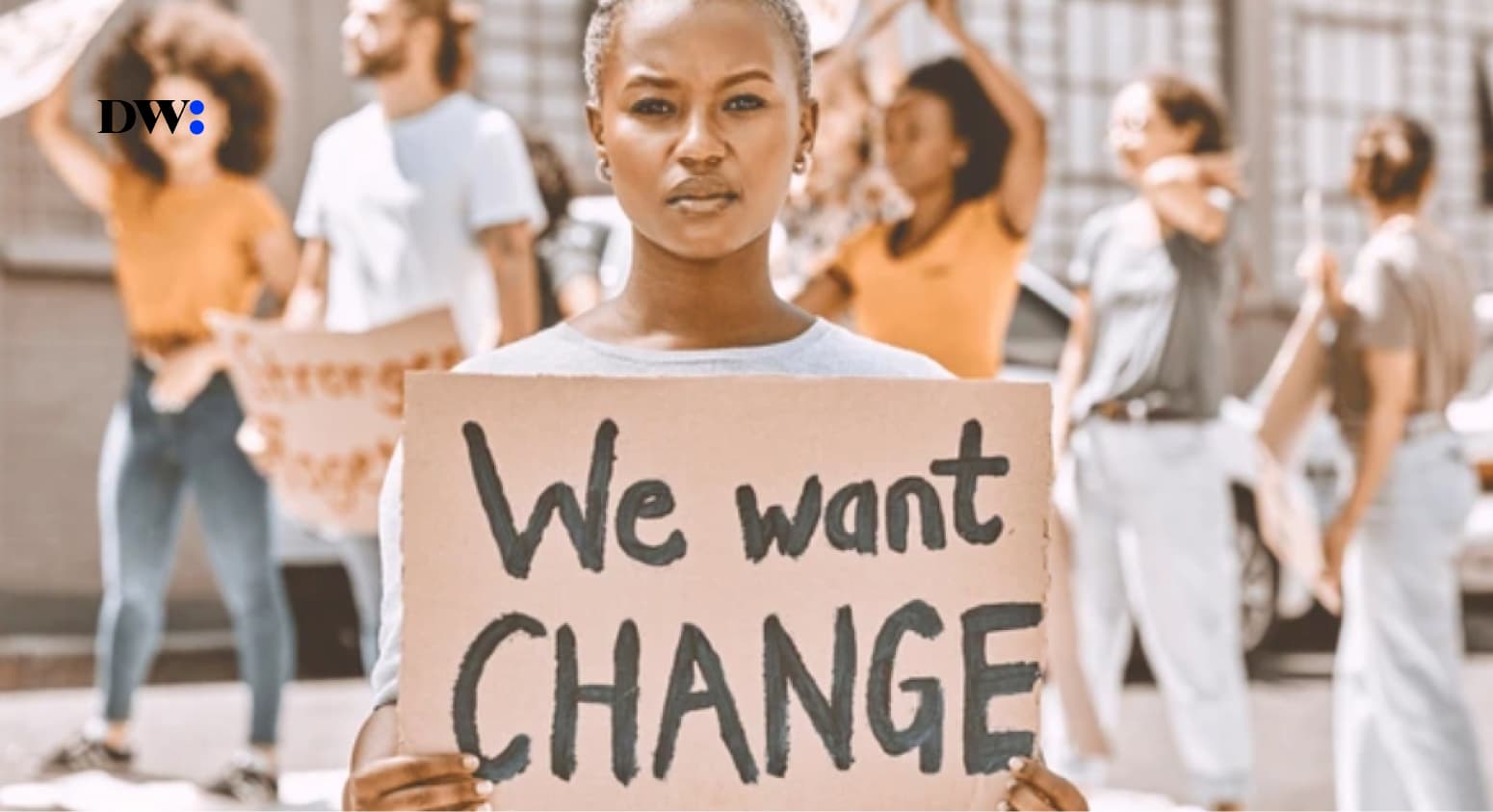Legal and social discrimination against women perpetuates a status quo in which they are seen as inferior to men. As a result, women all around the world are denied equal access to basic civil rights. Although the Constitution of Nigeria guarantees nondiscrimination and equal treatment of the genders, women in the country are nonetheless subject to discrimination and oppression. Reasons for this include gender bias in the law, social pressures to conform to traditional gender roles, a lack of opportunities to advance women’s education and the poor representation of women in political affairs.
Women in Abuja, Nigeria’s capital, protested in the streets on International Women’s Day 2022, demanding that lawmakers reverse their decision to reject legislation designed to increase women’s economic and political empowerment. As part of the proposed constitutional amendments that were rejected by federal lawmakers on March 1, a measure to award citizenship to foreign husbands of Nigerian women (a right now afforded to Nigerian men with foreign wives) and the inclusion of affirmative actions to ensure that more women can engage in politics and government leadership were both on the table.
In light of this, the top four presidential contenders for the forthcoming 2023 elections have Nigerian elections have expressed their intentions and plans on ways their administration would be addressing the aforementioned impediments;
The former Anambra state governor has declared that his administration would be committed to the inclusion of women. Speaking at the Voice Of Women VOW2022 Conference at the NAF Conference Centre in Abuja, he noted that during his administration, he had women make up 40 per cent of his cabinet as “women were far more committed and trustworthy.” He thus attributed his success as governor to the capable women who surrounded him.
Amongst other social, economic and political promises, a Peter Obi-led administration promises;
- Capable and qualified youths and women to spearhead his administration
- To see an increase in the girl child’s access to affordable and qualitative education, seeing as over 60 per cent of the out-of-school children in Nigeria are females
- Improve access to finance, particularly to MSMEs, youths and women, to significantly reduce unemployment and insecurity.
- Leverage the country’s diversity to give women and youths, the aged and persons with disabilities, an unfettered voice in governance, and a renewed sense of patriotism and faith in Nigeria.
- The future under this new generation of leaders will be defined by widespread prosperity based on high economic growth, equal access to health and educational facilities, and justice and fairness to all religious, ethnic, and social groups.
- Prioritise Human Capital Development through robust investments in STEM education, health, and infrastructural development, with emphasis on wealth creation, distribution and sustainable development.
Key Antecedents:
- As governor of Anambra State, Mr Obi had women occupy key positions of governance; his deputy, chief of staff, permanent secretary of Government House, commissioner for finance, accountant general, head of the service, commissioner for youths and sports, commissioner for planning, commissioner for education, and commissioner for local government, were all women.
- His Government won the Bill and Melinda Gates Foundation (1 Million dollars) as the best-performing state in immunisation in the South-East. With complementary funding from our Government, they used the money to build 10 Maternal and Child Care Centres across the State, particularly in rural communities, in partnership with the Churches.
- His Administration conceived and built, from scratch, the first state-owned Teaching Hospital, Chukwuemeka Odumegwu-Ojukwu teaching Hospital, Awka. Also, by the end of his tenure in 2014, more than twelve (12) health institutions, including two hospitals, had secured accreditation; before 2006, no health institution in Anambra State was duly accredited.
- To further enhance security, Anambra State provided at least one security vehicle to each of all the 177 communities in the State as well as various organisations such as markets and Churches.
- His Government commenced the planned development of the Igbariam Campus of the ChukwuemekaOdumegwu-Ojukwu University, including the fencing, construction of internal roads, electrification, construction of the Faculty of Law, Auditorium, Administrative Block, Faculty of Agriculture, Management Building, among others).
- Anambra State Government provided Microsoft Academies to more than 500 secondary schools, which the Head of Microsoft in Nigeria (Mr Ken Span) described as the biggest such deployment in Africa so far.
Senator Oluremi Tinubu, wife of the presidential candidate of the All Progressives Congress (APC), Asiwaju Bola Ahmed Tinubu, during a town hall meeting with women in Kano State, unveiled her husband’s plan for Nigerians, particularly the women and children. The women told the candidate’s wife what they would want Tinubu to do for them if he is elected president as well.
She unveiled education, health, agriculture, security, commerce and entrepreneurship training for women as the cardinal agenda of the APC, stating that women, children and other Nigerians will benefit when the sectors are reformed. Responding to demands made by women drivers in education, health, agriculture, business and entrepreneurship, during the town hall meeting, Tinubu promised that the Tinubu/Shetima administration will give women grants for economic empowerment if given the mandate by Nigerians.
Amongst other social, economic and political promises, a Tinubu-led administration promises;
- Free, compulsory basic education for all Nigerian children, with added incentives to persuade the girl-child to remain in school.
- To ensure grants and empowerment for women, while implementing policies that will encourage adult education for women.
- To revamp the health sector, taking into cognisance the issue of brain drain due to the mass exodus of Nigerian medical doctors and pharmacists abroad.
- Commercial banks will also be encouraged to ensure their loan application processes are simplified and that they give greater priority to young people and women with marketable ideas.
- To have at least 35% female representation at all levels of government.
- To work towards progressively improving the number of female lawmakers at state and national levels.
- To encourage the creation of Innovation and Productivity Hubs for youth to present their ideas and have them reviewed for marketability and utility. These hubs will generate business idea validation reports which will be used in partnership with commercial banks to vet loan applications.
- That legislation shall mandate the federal executive (particularly the cabinet and core senior advisers) to reserve a minimum number of senior positions for women. Private institutions shall be strongly encouraged to do likewise.
- To pass a presidential directive requiring that at least 20 per cent of political appointments to MDAs be reserved for qualified people under the age of forty
Key Antecedents:
- His administration was the first governor to appoint a woman as deputy governor in the country
- He is also credited for laying the foundation for the state’s economic success which made Lagos one of the most economically developed states in the country.
- The Tinubu administration is credited with laying the foundation for Lagos state’s economic success. He implemented policies to attract private investment, create jobs, and promote small and medium-sized enterprises. He also initiated the establishment of the Lagos State Employment Trust Fund (LSETF) to provide small business loans and the Lagos State Internal Revenue Service (LIRS) to increase tax collection among others. His administration performed magic by improving the state’s IGR from 600 million to over 8 billion Naira, a month.
- The Tinubu administration embarked on several large infrastructure projects including the construction of new roads, bridges, and flyovers. He also initiated the development of the Lagos State Transport Master Plan, which is aimed at improving public transportation in the state. This has been the core guideline for the development of Public transportation in Lagos
- The Tinubu administration implemented a free education policy for primary and secondary schools in the state, which helped to increase enrolment and improve the quality of education. He also initiated the establishment of several new primary and secondary schools across the state.
- The Tinubu administration established many new hospitals and primary healthcare centres across the state, as well as initiated several programs to improve health outcomes, including the Lagos State Health Insurance Scheme (LSHIS), LASAMBUS-Ambulance service. Primary health care centres and general hospitals sprang up in almost all LGAs. The administration created the health service commission whose duty it was to take care of personnel as well as the operational running of hospitals.
- Under Bola Ahmed Tinubu, Lagos state became the first and only state to break the monopoly of power generation and distribution in Nigeria through the Bola Ahmed Tinubu administration, Yinka Folawiyo Power Limited and Enron Corporation Independent Power Project. This project is still supplying close to 230 megawatts to the Egbin Thermal Station, from where the power is fed into the National Grid today.
- The civil service reform under Bola Ahmed Tinubu sought to reduce waste and curb financial mismanagement through incentives for civil servants as well as a salary increase.
- His payroll system reforms removed thousands of ghost workers from the service. These were achieved by applying principles he learnt from the corporate world.





